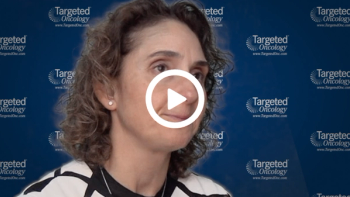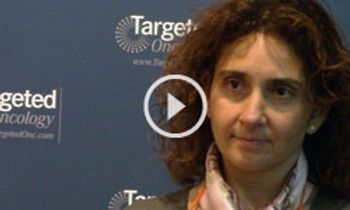
Virginia G. Kaklamani, MD, DSc, discusses datopotamab deruxtecan and other antibody-drug conjugates available for patients with unresectable or metastatic hormone receptor-positive, HER2-negative breast cancer.

Your AI-Trained Oncology Knowledge Connection!

Virginia G. Kaklamani, MD, is a professor of medicine in the division of hematology/oncology at UT Health San Antonio and is the leader of the Breast Cancer Program at UT Health San Antonio MD Anderson Cancer Center.

Virginia G. Kaklamani, MD, DSc, discusses datopotamab deruxtecan and other antibody-drug conjugates available for patients with unresectable or metastatic hormone receptor-positive, HER2-negative breast cancer.

Virginia G. Kaklamani, MD, DSc, discusses findings from the phase 3 TROPION-Breast01 trial of datopotamab deruxtecan.

Virginia G. Kaklamani, MD, DSc, discusses how effective elacestrant (Orserdu) is in CDK4/6 inhibitor-naive estrogen receptor-positive/HER2-negative metastatic breast cancer treatment.

In this episode of Targeted Talks, Virginia Kaklamani, MD, DSc, discusses the background, findings, and implications of the phase 3 EMERALD trial.

Virginia Kaklamani, MD, DSc, explains that key unmet needs in HR+/HER2- metastatic breast cancer include overcoming diverse mechanisms of endocrine resistance with genomic profiling and new agents like oral SERDs while managing side effects.

Virginia Kaklamani, MD, DSc, explains that managing adverse events like fatigue, GI toxicity, and musculoskeletal pain in patients with HR+/HER2- metastatic breast cancer using approaches such as exercise, anti-nausea medication, acupuncture, and supplements is key to meeting the dual treatment goals of prolonging life and maintaining quality of life.

Virginia Kaklamani, MD, DSc, details that disease burden and location of metastases in patients with HR+/HER2- metastatic breast cancer guide approaches to management, with visceral metastases indicating potentially faster progression and more concerning symptoms.

Virginia Kaklamani, MD, DSc, shares that in deciding second-line therapy for metastatic breast cancer after CDK4/6 inhibitors, endocrine sensitivity guides the choice between treatments based on ESR1/PIK3CA mutations and safety profiles with/without fulvestrant injections.

Subgroup analyses from the EMERALD trial show that oral SERD elacestrant may outperform standard endocrine therapy in metastatic breast cancer patients with bone or visceral metastases who previously received CDK4/6 inhibitors.

Virginia Kaklamani, MD, DSc, explains that in second-line treatment of metastatic HR+/HER2- breast cancer after CDK4/6 inhibitors, biomarker testing guides the choice between therapies based on the safety and resistance mutation profiles.

Virginia Kaklamani, MD, DSc, reviews the presented case of a postmenopausal patient with breast cancer who develops metastases after adjuvant endocrine therapy ends, and explains that later treatment selection is difficult because of endocrine resistance and mutations causing more aggressive disease.

Virginia Kaklamani, MD, presents the case of a 56-year-old woman with HR+/HER2- metastatic breast cancer and visceral metastases.

Virginia G. Kaklamani, MD, professor of medicine, University of Texas Health Sciences Center in San Antonio, discusses bone health in women with breast cancer.

Published: December 16th 2014 | Updated: